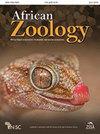The Status of COI and 12S rRNA DNA Barcode Reference Libraries for Freshwater Fish in South Africa: Implications for Future eDNA Projects
IF 0.5
4区 生物学
Q4 ZOOLOGY
引用次数: 0
Abstract
Environmental DNA metabarcoding (eDNA) is a rapidly emerging field in which high-throughput sequencing is used to catalogue the biodiversity of ecosystems through the amplification of DNA extracted from environmental samples (water, air, faeces and soil). Although eDNA has strong links to DNA barcoding, the molecular marker most often used to detect vertebrates in eDNA studies is a portion of the mitochondrial 12S ribosomal RNA (12S rRNA) and not the standard cytochrome oxidase I (COI) marker used in traditional DNA barcoding. eDNA methods rely on a comprehensive reference library to link sequence data to species, which are often lacking in hyper-diverse countries such as South Africa. In this study, we review the present state of DNA barcode reference databases for both 12S rRNA and COI for freshwater fish (native and introduced) found in South African aquatic systems. Analysis of DNA records available on GenBank and the Barcode of Life Database (BOLD) revealed incomplete records of the examined taxa for both markers. Our findings showed that 34 species, 6 genera and 0 families of native South African freshwater fish lack COI barcode records, while 86 species, 22 genera and 8 families lack 12S rRNA records. Unlike the native freshwater fish, the non-native fish all had barcode records available for both COI and 12S rRNA. Producing comprehensive reference libraries for both markers is an important first step in developing an eDNA protocol for the non-invasive monitoring of native and non-native freshwater fish in South Africa.南非淡水鱼 COI 和 12S rRNA DNA 条形码参考文献库的现状:对未来 eDNA 项目的影响
环境 DNA 代谢编码(eDNA)是一个迅速崛起的领域,通过对从环境样本(水、空气、粪便和土壤)中提取的 DNA 进行扩增,利用高通量测序对生态系统的生物多样性进行编目。虽然 eDNA 与 DNA 条形码有密切联系,但在 eDNA 研究中最常用于检测脊椎动物的分子标记是线粒体 12S 核糖体 RNA(12S rRNA)的一部分,而不是传统 DNA 条形码中使用的标准细胞色素氧化酶 I(COI)标记。在本研究中,我们回顾了南非水生系统中淡水鱼类(本地和引进)12S rRNA 和 COI 的 DNA 条形码参考数据库的现状。对 GenBank 和生命条形码数据库(BOLD)中的 DNA 记录进行分析后发现,所研究类群的这两种标记的记录都不完整。我们的研究结果表明,南非本地淡水鱼中有 34 种、6 属和 0 科缺少 COI 条形码记录,86 种、22 属和 8 科缺少 12S rRNA 记录。与本地淡水鱼不同,非本地鱼类都有 COI 和 12S rRNA 的条形码记录。为这两种标记建立全面的参考文献库,是为南非本地和非本地淡水鱼类的非侵入性监测制定 eDNA 协议的重要第一步。
本文章由计算机程序翻译,如有差异,请以英文原文为准。
求助全文
约1分钟内获得全文
求助全文
来源期刊

African Zoology
生物-动物学
CiteScore
2.60
自引率
9.10%
发文量
18
审稿时长
>12 weeks
期刊介绍:
African Zoology , a peer-reviewed research journal, publishes original scientific contributions and critical reviews that focus principally on African fauna in terrestrial, freshwater, and marine ecosystems. Research from other regions that advances practical and theoretical aspects of zoology will be considered. Rigorous question-driven research in all aspects of zoology will take precedence over descriptive research. The Journal publishes full-length papers, critical reviews, short communications, letters to the editors as well as book reviews. Contributions based on purely observational, descriptive or anecdotal data will not be considered.
The Journal is produced by NISC in association with the Zoological Society of South Africa (ZSSA). Acceptance of papers is the responsibility of the Editors-in-Chief in consultation with the Editors and members of the Editorial Advisory Board. All views expressed are those of the author and not necessarily those of the Editors or the Department.
 求助内容:
求助内容: 应助结果提醒方式:
应助结果提醒方式:


